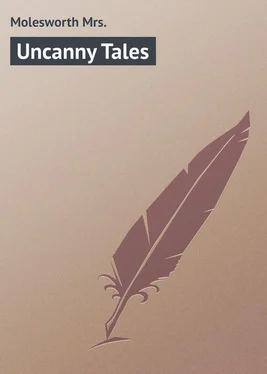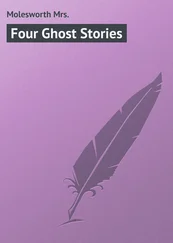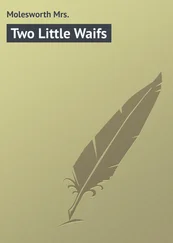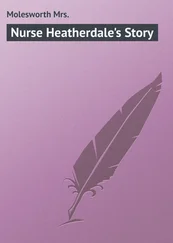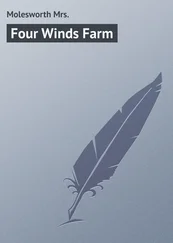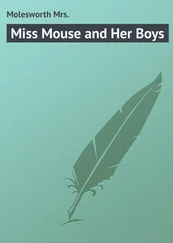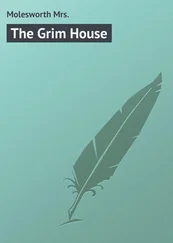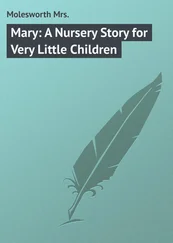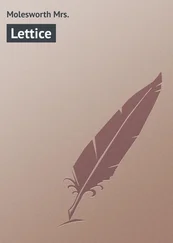Mrs. Molesworth - Uncanny Tales
Здесь есть возможность читать онлайн «Mrs. Molesworth - Uncanny Tales» — ознакомительный отрывок электронной книги совершенно бесплатно, а после прочтения отрывка купить полную версию. В некоторых случаях можно слушать аудио, скачать через торрент в формате fb2 и присутствует краткое содержание. Жанр: foreign_prose, на английском языке. Описание произведения, (предисловие) а так же отзывы посетителей доступны на портале библиотеки ЛибКат.
- Название:Uncanny Tales
- Автор:
- Жанр:
- Год:неизвестен
- ISBN:нет данных
- Рейтинг книги:4 / 5. Голосов: 1
-
Избранное:Добавить в избранное
- Отзывы:
-
Ваша оценка:
- 80
- 1
- 2
- 3
- 4
- 5
Uncanny Tales: краткое содержание, описание и аннотация
Предлагаем к чтению аннотацию, описание, краткое содержание или предисловие (зависит от того, что написал сам автор книги «Uncanny Tales»). Если вы не нашли необходимую информацию о книге — напишите в комментариях, мы постараемся отыскать её.
Uncanny Tales — читать онлайн ознакомительный отрывок
Ниже представлен текст книги, разбитый по страницам. Система сохранения места последней прочитанной страницы, позволяет с удобством читать онлайн бесплатно книгу «Uncanny Tales», без необходимости каждый раз заново искать на чём Вы остановились. Поставьте закладку, и сможете в любой момент перейти на страницу, на которой закончили чтение.
Интервал:
Закладка:
"I'll show you another way back into the house," said Dormy, and he led me through a conservatory into a large, almost unfurnished room, opening again into a tiled passage leading to the offices.
"This is the Warden boys' playroom," he said. "They keep their cricket and football things here, you see, and their tricycle. I wonder if I might use it?"
"We must write and ask them," I said. "But what are all these big packages?" I went on. "Oh, I see, its our heavy luggage from Finster. There is not room in this house for our odds and ends of furniture, I suppose. It's rather a pity they have put it in here, for we could have had some nice games in this big room on a wet day, and see, Dormy, here are several pairs of roller skates! Oh, we must have this place cleared."
We spoke to father about it – he came and looked at the room and agreed with us that it would be a pity not to have the full use of it. Roller skating would be good exercise for Dormy, he said, and even for Nat, who would be joining us before long for his holidays.
So our big cases, and the chairs and tables we had bought from Hunter, in their careful swathings of wisps and matting, were carried out to an empty barn – a perfectly dry and weather-tight barn – for everything at the Rectory was in excellent repair. In this, as in all other details, our new quarters were a complete contrast to the picturesque abode we had just quitted.
The weather was charming for the first two or three weeks – much warmer and sunnier than at Finster. We all enjoyed it, and seemed to breathe more freely. Miss Larpent, who was staying through the holidays this year, and I congratulated each other more than once, when sure of not being overheard, on the cheerful, wholesome atmosphere in which we found ourselves.
"I do not think I shall ever wish to live in a very old house again," she said one day. We were in the play-room, and I had been persuading her to try her hand – or feet – at roller skating. "Even now," she went on, "I own to you, Leila, though it may sound very weak-minded, I cannot think of that horrible night without a shiver. Indeed, I could fancy I feel that thrill of indescribable cold at the present moment."
She was shivering – and, extraordinary to relate, as she spoke, her tremor communicated itself to me. Again, I could swear to it, again I felt that blast of unutterable, unearthly cold.
I started up. We were seated on a bench against the wall – a bench belonging to the play-room, and which we had not thought of removing, as a few seats were a convenience.
Miss Larpent caught sight of my face. Her own, which was very white, grew distressed in expression. She grasped my arm.
"My dearest child," she exclaimed, "you look blue, and your teeth are chattering! I do wish I had not alluded to that fright we had. I had no idea you were so nervous."
"I did not know it myself," I replied. "I often think of the Finster ghost quite calmly, even in the middle of the night. But just then, Miss Larpent, do you know, I really felt that horrid cold again!"
"So did I – or rather my imagination did," she replied, trying to talk in a matter-of-fact way. She got up as she spoke, and went to the window. "It can't be all imagination," she added. "See, Leila, what a gusty, stormy day it is – not like the beginning of August. It really is cold."
"And this play-room seems nearly as draughty as the gallery at Finster," I said. "Don't let us stay here – come into the drawing-room and play some duets. I wish we could quite forget about Finster."
"Dormy has done so, I hope," said Miss Larpent.
That chilly morning was the commencement of the real break-up in the weather. We women would not have minded it so much, as there are always plenty of indoor things we can find to do. And my two grown-up brothers were away. Raxtrew held no particular attractions for them, and Phil wanted to see some of our numerous relations before he returned to India. So he and Nugent started on a round of visits. But, unluckily, it was the beginning of the public school holidays, and poor Nat – the fifteen-year-old boy – had just joined us. It was very disappointing for him in more ways than one. He had set his heart on seeing Finster, impressed by our enthusiastic description of it when we first went there, and now his anticipations had to come down to a comparatively tame and uninteresting village, and every probability – so said the wise – of a stretch of rainy, unsummerlike weather.
Nat is a good-natured, cheery fellow, however – not nearly as clever or as impressionable as Dormy, but with the same common sense. So he wisely determined to make the best of things, and as we were really sorry for him, he did not, after all, come off very badly.
His principal amusement was roller-skating in the play-room. Dormy had not taken to it in the same way – the greater part of his time was spent with the rabbits and guinea-pigs, where Nat, when he himself had had skating enough, was pretty sure to find him.
I suppose it is with being the eldest sister that it always seems my fate to receive the confidences of the rest of the family, and it was about this time, a fortnight or so after his arrival, that it began to strike me that Nat looked as if he had something on his mind.
"He is sure to tell me what it is, sooner or later," I said to myself. "Probably he has left some small debts behind him at school – only he did not look worried or anxious when he first came home."
The confidence was given. One afternoon Nat followed me into the library, where I was going to write some letters, and said he wanted to speak to me. I put my paper aside and waited.
"Leila," he began, "you must promise not to laugh at me."
This was not what I expected.
"Laugh at you – no, certainly not," I replied, "especially if you are in any trouble. And I have thought you were looking worried, Nat."
"Well, yes," he said, "I don't know if there is anything coming over me – I feel quite well, but – Leila," he broke off, "do you believe in ghosts?"
I started.
"Has any one – " I was beginning rashly, but the boy interrupted me.
"No, no," he said eagerly, "no one has put anything of the kind into my head – no one. It is my own senses that have seen – felt it – or else, if it is fancy, I must be going out of my mind, Leila – I do believe there is a ghost here in the play-room ."
I sat silent, an awful dread creeping over me, which, as he went on, grew worse and worse. Had the thing – the Finster shadow – attached itself to us – I had read of such cases – had it journeyed with us to this peaceful, healthful house? The remembrance of the cold thrill experienced by Miss Larpent and myself flashed back upon me. And Nat went on.
Yes, the cold was the first thing he had been startled by, followed, just as in the gallery of our old castle, by the consciousness of the terrible shadow-like presence, gradually taking form in the moonlight. For there had been moonlight the last night or two, and Nat, in his skating ardour, had amused himself alone in the play-room after Dormy had gone to bed.
"The night before last was the worst," he said. "It stopped raining, you remember, Leila, and the moon was very bright – I noticed how it glistened on the wet leaves outside. It was by the moonlight I saw the – the shadow. I wouldn't have thought of skating in the evening but for the light, for we've never had a lamp in there. It came round the walls, Leila, and then it seemed to stop and fumble away in one corner – at the end where there is a bench, you know."
Indeed I did know; it was where our governess and I had been sitting.
"I got so awfully frightened," said Nat honestly, "that I ran off. Then yesterday I was ashamed of myself, and went back there in the evening with a candle. But I saw nothing: the moon did not come out. Only – I felt the cold again. I believe it was there – though I could not see it. Leila, what can it be? If only I could make you understand! It is so much worse than it sounds to tell."
Читать дальшеИнтервал:
Закладка:
Похожие книги на «Uncanny Tales»
Представляем Вашему вниманию похожие книги на «Uncanny Tales» списком для выбора. Мы отобрали схожую по названию и смыслу литературу в надежде предоставить читателям больше вариантов отыскать новые, интересные, ещё непрочитанные произведения.
Обсуждение, отзывы о книге «Uncanny Tales» и просто собственные мнения читателей. Оставьте ваши комментарии, напишите, что Вы думаете о произведении, его смысле или главных героях. Укажите что конкретно понравилось, а что нет, и почему Вы так считаете.
